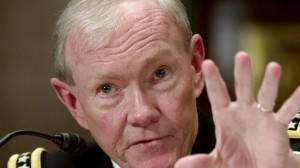 chairman of the U.S. Joint Chiefs of Staff, General Martin Dempsey[/caption]
chairman of the U.S. Joint Chiefs of Staff, General Martin Dempsey[/caption]WASHINGTON: Iran's role in an Iraqi military offensive to recapture�Tikrit�could be positive as long as it does not fuel sectarian divisions in the country, the�U.S.�military's top officer said Tuesday.
General Martin Dempsey, chairman of the U.S. Joint Chiefs of Staff, told senators that Iran's military assistance for Shiite militia was nothing new but was carried out in a more open manner this week as Iraqi forces pushed to retake Tikrit from�ISIS�jihadis.
"This is the most overt conduct of Iranian support," Dempsey said, which came "in the form of artillery" and other aid.
"Frankly, it would only be a problem if it resulted in sectarianism," he told the Senate Armed Services Committee.
U.S. commanders rarely discuss Iran's activities in�Iraq�in public, stressing that�Washington�does not coordinate with Tehran's military in any way -- even though the two foes see ISIS group as a common enemy.
U.S. officials have pressed the Shiite-led government in�Baghdad�to reach out to the country's alienated Sunni community and worry that Shiite militia could persecute the Sunni community as they push to roll back ISIS.
In an assault launched Monday, officials in Baghdad say a 30,000-strong force has been mobilized to take back Tikrit.
Dempsey said Shiite militia -- which are armed by�Tehran�-- account for about two-thirds of the force while Iraqi government army troops make up the remainder.
If the Iraqi army and Shiite fighters "perform in a credible way" and defeat the jihadis in Tikrit, "then it will, in the main, have been a positive thing in terms of the counter-ISIL campaign," Dempsey said.
- Iranian commander -
General Qassem Suleimani, the head of Iran's powerful Quds force, is reportedly on the ground with Shiite fighters coordinating the operation on Tikrit.
Dempsey said he had seen a recent photo of the commander in social media and that U.S. intelligence agencies "will now go to work to decide if he was personally there or not."
At the same hearing, Defense Secretary�Ashton Carter�acknowledged Iraq did not ask for military support from Washington for the Tikrit operation, the largest assault so far by Baghdad against ISIS.
Carter said he shared Dempsey's concerns about sectarian divisions erupting and that Washington was closely monitoring the conduct of the campaign.
"I hope sectarianism does not show its ugly head," Carter said.
But after the hearing, two Republican hawks on the committee, John McCain and Lindsey Graham, demanded President Barack Obama's administration "wake up" to the threat posed by Iran's influence in Iraq, saying Tehran's backing of Shiite militia could derail the war effort against ISIS.
"The Iranian-backed offensive in Tikrit, and its growing role in Iraq more broadly, is not only threatening our mission against ISIL.
"It is being led by the same Shia militias that killed American soldiers in Iraq and directed by the same Iranian leaders that gave them the weapons and training to do it," said a joint statement from the two senators.
By AFP










